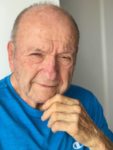
SAN DIEGO — The First Can
One day, when I was sixteen, Helen, a family friend from Babylon, Long Island, drove me to a remote part of Jones Beach so I could go clam-digging with a pitchfork. She knew this was a good place. “There’s many eddy holes caused by the current in this area, and has always been a good place to find clams, she said.” “Watch out for the sudden drop offs though,” she remarked.
It was off-season and the beach was empty, except for a large family apparently from another country. They were all dressed in distinctively non-American beach clothing,-the men wore suits and ties and the women wore long dresses. Only a young boy about eleven years old wore a bathing suit. He was going for a swim no matter what.
The air and water temperatures were still quite comfortable, so I quickly took off the clothes covering my bathing suit and strode into the water. I had the pitchfork braced across my chest like a Roman warrior entering battle. The young boy quickly followed. I waded to a comfortable thigh depth, digging my pitchfork into the smooth fine sand underfoot. The water was quite murky and the bottom was difficult to see, even at this shallow depth. The only way I was able to detect if I had a clam was by the feel of the shell rattling around on the fork tines. As I searched the area, with occasional success, I kept wandering out to deeper water and kerplunk, suddenly found myself over my head in one of the holes Helen had warned me about. I was a strong and sure swimmer, so I was not concerned. Recently I had received my senior lifesaving certificate from the American Red Cross, and easily swam back to good shallow footing.
My back was turned away from the boy when I heard shouting and screaming. I turned and saw the lad had fallen into one of these potholes and he was flailing around, obviously not knowing how to swim. His grandfather instinctively raced into the water to rescue his heir and forgot that he, too, couldn’t swim. They were about 70 feet from me. I yelled and motioned for the others to stay out of the water afraid that I would not be able to rescue any more more of them if they got in trouble. I threw the pitchfork on shore and swam as fast as I could toward the two people in trouble. I grabbed the young boy first, turned him around as I had been taught, hooked my palm under his chin, and quickly scissor kicked back towards shore. He was grabbed by the other men, who smartly had linked hands to form a human chain to move deeper into the water. Immediately, I turned around and swam as fast as I could out to the grandfather, who was quite near the end of his voyage on earth. I grabbed him securely, and brought him in to live another day. I was quite pleased with myself. My Red Cross training had paid off sooner than I expected.
As I was drying myself with my towel, I watched the family, cuddling into a circle of love, their blessed ones safe and secure in their bosom. They were all speaking loudly and emotionally, and self-involved in their own language. Finally, one of the men came over to me, in the only acknowledgement of my deed, and handed me a warm can of orange soda, my Congressional Medal of Honor.
The Second Can
Carole and I toured China in 1998. The Chinese government owned all of the seven domestic airlines. The airplanes flying international routes were modern and up-to-date to compete with the the world. Not so the domestic ones, the Chinese were still using many old Soviet planes with dubious safety records.
We waited on the tarmac of a small airport to board one of these ancient craft. The name on the aluminum skin of the two-engine airplane read, “Wu Han Airlines.” While waiting, I glanced at the two main landing gears, and my eyes bugged out. The tire on one wheel was semi-bald and the tire on the other wheel was completely treadless. If there was a tack on the runway, we were in big trouble. Reluctantly, I boarded the aircraft. The flight attendant took my carry-on bag and tossed it to the rear of the aircraft, where it landed in a heap on top of all the others. There was no overhead baggage rack.
I was further discomforted when I noticed some wires hanging down in cracks between the overhead and sidewall. All through the flight, minute clouds of moisture from the air conditioner condensed into droplets of water and ran down the sides of the plane onto our laps or the floor.
The best was left for last. Although the flight lasted less than and hour, this wannabe airline provided its version of lunch. The flight attendant unceremoniously dropped a box on each of our laps, the contents of which were two identical uncut bread rolls and one yellow unglazed cup cake. I examined each roll to see if it contained a spread or cold cut. Nope! Just two pieces of bread. I asked the attendant for a drink of coffee, tea, or milk to wash down the bit of roll, but instead we were each given a can of orange soda. No other choice.
*
Ira Spector is a freelance writer based in San Diego.